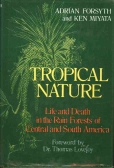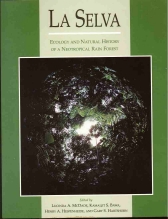| Tropical Ecology: Course Syllabus |
| Tropical Ecology: Course Syllabus |
| Lecturer: |
Dr. Ron Coleman 1311 35th Avenue Sacramento, CA 95822 916-424-0720 Pacific Time Zone rcoleman@cichlidresearch.com or rmcoleman@ucdavis.edu |
| Tutorial Assistant: |
Cori Carveth ccarveth@excite.com |
| Alternate Contact: |
Dr. Michael Berrill Department of Biology Trent University Peterborough, Ontario 705-748-1048? 705-748-1205 (FAX) mberrill@trentu.ca |
Course Location & Times:
For this course we will be travelling to the La Selva Biological Station, Costa Rica and staying there from May 1 to May 11, 2001. This will require travelling on April 30 and returning on May 14.
The purpose of the course is to immerse you 100% in Tropical Biology.
Website: much of the preparation and information for the course will be done via this website <http://cichlidresearch.com/trent/trentindex.html> and using email. Be sure that you check back often for any updates. Trips of this nature are complicated to orchestrate and last-minute changes may be necessary.
Lectures:
At this time, we are evaluating the possibility of a one or two day pre-course briefing to be held likely in March. At these lectures, I will go over what we will do in the field along with the precautions you need to take, equipment you should have, etc.
Texts:
I strongly suggest that you start reading the book "Tropical Nature" (see below). The more you know before you go to the tropics, the more enjoyable your trip will be. Leaf through the other book, find a section that interests you, and read it thoroughly.

|
Forsyth, Adrian & Miyata, Ken (1987) Tropical Nature. MacMillian, Toronto. Required. ISBN: 0684187108. Tropical Nature will inspire you about what you will see, how to look for it, and how to look at it. Adrian Forsyth is an excellent writer. This book is available on Amazon.com but it may be available in a local bookstore. |

|
McDade, Lucinda A. et al. (1994) La Selva: Ecology and Natural History of a Neotropical Rain Forest. University of Chicago Press, Chicago. Required. ISBN: 0-226-03952-8 This book provides the academic material about the place we are going to visit, namely the La Selva Biological Station in Costa Rica. You do not have to learn all of it: I have been to La Selva eight times and much of it is still a mystery; however, the more you learn before you go, the more you will enjoy your trip. In the back of this book you will find lists of the flora and fauna found at La Selva. This book is available from Amazon.com or ask at your University bookstore. It may take 4 to 6 weeks to get so order it NOW. |
Other Books:
There are a number of good texts and field guides to tropical biology (click here); however, you do not have to bring any of these. If you have a particular love of a group of animals or plants, you might consider bringing your own copy of the relevant field guides.
Equipment:
You will be responsible for bringing your own equipment to function in the tropical rainforest. I will supply you with a very detailed list of these items. Many can be borrowed, found or purchased for relatively little money though a few are costly, e.g. hiking boots. The trick is to start early -- don't leave things to the last minute.
Grading and Exams:
Grades will be based on a term paper (30%), a field project (20%), other assignments (20%), oral presentation (20%) and participation (10%). There will be no exams.
Passport:
You absolutely must have a valid passport to go on this trip. If you do not already have one, and you are a Canadian citizen, apply for one NOW. If you are not a Canadian citizen, it is up to you to make sure that you have the correct papers for entering and leaving Costa Rica. Canadians DO NOT require a special VISA, and you do not need to go to a consulate prior to your trip: you simply enter Costa Rica at the airport as a short-term visitor, and they stamp your passport with a visitor's VISA on the spot.
Cost:
As with any University course, you must pay tuition for this course. That amount, which I believe is roughly $425 ??? (for 1/2 credit) is separate from the other course costs.
There are substantial costs to running a course like this, including airfare, ground transportation, and the cost of staying at the station (which is expensive). On the other hand, only a very few people in the world are able to visit this station (La Selva is the premiere tropical field station in the world, and if you were to do so as an individual, the cost would be at least double what you will be paying.
Because the costs fluctuate due to foreign currency exchange, air fare prices, etc. at this time I can only estimate the costs to be approximately $1700 CAN.
![[Go Back to Contents]](../gifs/back.gif) |
![[Send email to Ron Coleman]](../gifs/address.gif) |